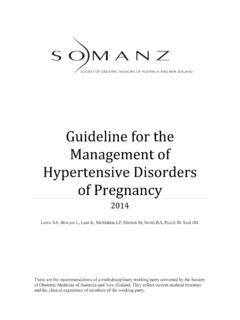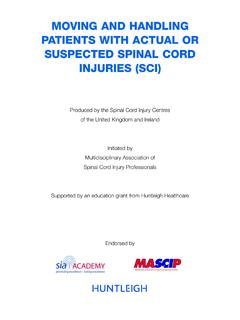Transcription of NATIONAL ELECTIVE SURGERY URGENCY CATEGORISATION
1 NATIONAL ELECTIVE . SURGERY URGENCY . CATEGORISATION . GUIDELINE APRIL 2015. ACKNOWLEDGEMENTS. The Australian Health Ministers' Advisory Council (AHMAC) would like to acknowledge the contributions of a range of stakeholders who provided valuable input into the development of this guideline. In particular, the members of the Project Steering Committee with representatives from the Royal Australasian College of Surgeons, Australian Government and states and territories. AHMAC would also like to acknowledge the contributions of the Australian surgical community, including surgeons from the Royal Australian and New Zealand College of Obstetricians and Gynaecologists (RANZCOG); the Royal Australian and New Zealand College of Ophthalmologists (RANZCO) and the Royal Australasian College of Surgeons (RACS) and affiliated surgical specialities: Australian and New Zealand Association of Paediatric Surgeons Australian and New Zealand Society for Vascular SURGERY Australian Orthopaedic Association Colorectal Surgical Society of Australia and New Zealand General Surgeon's Australia The Australian Society of Plastic Surgeons The Australian Society of Otolaryngology Head & Neck SURGERY The Neurological Society of Australasia The Australian and New Zealand Society of Cardiac and Thoracic Surgeons Urological Society of Australia and New Zealand.
2 Australian Health Ministers' Advisory Council, April 2015. This publication is copyright, no part may be reproduced by any process except in accordance with the provisions of the Copyright Act 1968. CONTENTS. SUMMARY OF KEY 2. 3. 3. Clinical Consultation .. 4. Simplified clinical URGENCY 4. 4. Guiding Principles .. 4. Implication for State and Territory 5. NATIONAL SELECTED COMMON ELECTIVE SURGERY 6. CARDIO THORACIC 7. GENERAL 8. GYNAECOLOGY 9. 10. OPHTHALMOLOGY ORTHOPAEDIC SURGERY ..12. OTOLARYNGOLOGY HEAD AND NECK PAEDIATRIC PLASTIC AND RECONSTRUCTIVE UROLOGICAL VASCULAR APPENDIX: ALPHABETICAL LISTING OF ALL ELECTIVE SURGERY NATIONAL ELECTIVE SURGERY URGENCY CATEGORISATION PAGE 1. ONE. SUMMARY OF KEY POINTS. The purpose of the guideline Where multiple procedures is to promote NATIONAL are being performed on one consistency and comparability patient, the URGENCY category in URGENCY CATEGORISATION and should be allocated to the improve equity of access primary procedure.
3 For patients undergoing ELECTIVE SURGERY . The guideline does not overrule State or Territory The guideline acts as a policies or directives reference for treating and should be used and clinicians when assigning interpreted in conjunction an URGENCY category for with any such policies ELECTIVE SURGERY procedures and directives. listed in the guideline. Where a discrepancy between The nominated usual URGENCY the guideline and local policy category' is provided as a occurs, local State or Territory guide only for categorising policy will always take selected procedures. priority. In all circumstances the URGENCY category should be appropriate to the patient and their clinical situation and not influenced by the availability of hospital or surgeon resources.
4 NATIONAL ELECTIVE SURGERY URGENCY CATEGORISATION PAGE 3. TWO. INTRODUCTION. Background The NATIONAL definitions are expected to facilitate access to ELECTIVE SURGERY for patients according In 2012, the Royal Australasian College of to clinical need, maximise equity of access, Surgeons (RACS) and the Australian Institute minimise harm associated with delayed access of Health and Welfare (AIHW) worked together and support an appropriate balance between to develop NATIONAL definitions for ELECTIVE consistency of practice and clinical decision SURGERY URGENCY categories, at the request of making when assigning an URGENCY category. the COAG Health Council (Health Ministers). The development of the NATIONAL definitions The full RACS / AIHW report can be found resulted in a package of six integrated at the following website: components proposed for adoption: detail/?
5 Id=60129543979. Figure 1. The NATIONAL ELECTIVE SURGERY URGENCY 1. A statement of an overarching principle category definitions package. for URGENCY category assignment 2. Simplified, time-based URGENCY category definitions 3. A listing of the usual URGENCY categories for higher volume procedures 4. Comparative information disseminated about URGENCY CATEGORISATION 5. Treat in turn' as a principle for ELECTIVE SURGERY management 6. Clarified approaches for patients who are not ready for SURGERY . Source: NATIONAL definitions for ELECTIVE SURGERY URGENCY categories, Australian Institute of Health and Welfare & Royal Australasian College of Surgeons, July 2013. PAGE 4 NATIONAL ELECTIVE SURGERY URGENCY CATEGORISATION . Simplified clinical URGENCY categories Purpose Previously, the definitions of URGENCY categories The purpose of categorising ELECTIVE SURGERY included reference to the potential for the patient's patients by URGENCY category is to manage patient condition to deteriorate and become an emergency.
6 Access equitably, so that priority is given to those The definition also referred to the extent to which who are assessed as having the greatest need. it was causing pain, dysfunction or disability. The purpose of the guideline is to support an appropriate balance between consistency of The new definitions of the URGENCY categories practice and clinical decision making when assigning are based purely on the timeframe in which the an URGENCY category. It aims to enhance the overall procedure is clinically indicated, as judged by ELECTIVE SURGERY waiting list management with the treating clinician. The categories and timeframes benefits for individual patients and their families, were chosen because they can be intuitively clinicians, ELECTIVE SURGERY service managers and meaningful for clinicians.
7 Policy makers. The simplified time based clinical URGENCY categories are as follows: Category 1: Procedures that are clinically indicated within 30 days Category 2: Procedures that are clinically indicated within 90 days Category 3: Procedures that are clinically indicated within 365 days Clinical Consultation Expanding the work of the initial report, a further project was undertaken in 2014 to create a NATIONAL ELECTIVE SURGERY URGENCY CATEGORISATION Guideline. The Guideline was developed with input from the Royal Australasian College of Surgeons (RACS), the Royal Australian and New Zealand College of Ophthalmologists (RANZCO) and Royal Australian and New Zealand College of Obstetricians and Gynaecologists (RANZCOG). Existing CATEGORISATION guidelines from a number of States and Territories informed the initial draft, which was provided to the specialty groups for consideration and feedback.
8 This feedback then informed the final version of the NATIONAL Guideline presented in this document. The important principle acknowledged by the NATIONAL project and strongly supported by all specialty groups and colleges is that this document is to act as a guide only. Assignment of clinical URGENCY categories is a clinical decision made by treating clinicians (see Guiding Principles'). NATIONAL ELECTIVE SURGERY URGENCY CATEGORISATION PAGE 5. Implication for State Guiding Principles and Territory Policies n In all circumstances it is the responsibility In Australia, each State and Territory has an ELECTIVE of the treating surgeon to assign the SURGERY Access Policy (or an equivalent thereof). URGENCY category. that provides guidance to health services on n The URGENCY category should be appropriate management of ELECTIVE SURGERY .
9 The NATIONAL to the patient and their clinical situation ELECTIVE SURGERY URGENCY CATEGORISATION Guideline and not influenced by the availability of is to be used in conjunction with State and Territory hospital or surgeon resources. policy, noting that if there is a discrepancy between the NATIONAL Guideline and local policy, State and n The usual URGENCY category listed in this Territory policy will always take priority. guide should be used to assign an URGENCY category unless a patient's clinical Each jurisdiction has policies that provide guidance indications require earlier treatment. on types of procedures that can be performed in n If a patient's clinical indications require the public sector. These guidelines should be the allocation of an alternative category followed at all times.
10 A commonly agreed principle to the usual URGENCY category listed in across all jurisdictions is that no SURGERY should be the guideline the treating surgeon should performed in the public sector that is undertaken follow the escalation principles outlined for purely aesthetic reasons, that is, with the sole in their respective State or Territory intention of improving a patient's appearance or ELECTIVE SURGERY policy. self-esteem. This guideline supports this principle. n Where multiple procedures are being Reconstructive SURGERY is performed on abnormal performed, URGENCY category should be structures of the body caused by congenital allocated to the primary procedure. defects, developmental abnormalities, trauma, n Patients with a malignant condition are infection, tumours or disease.




